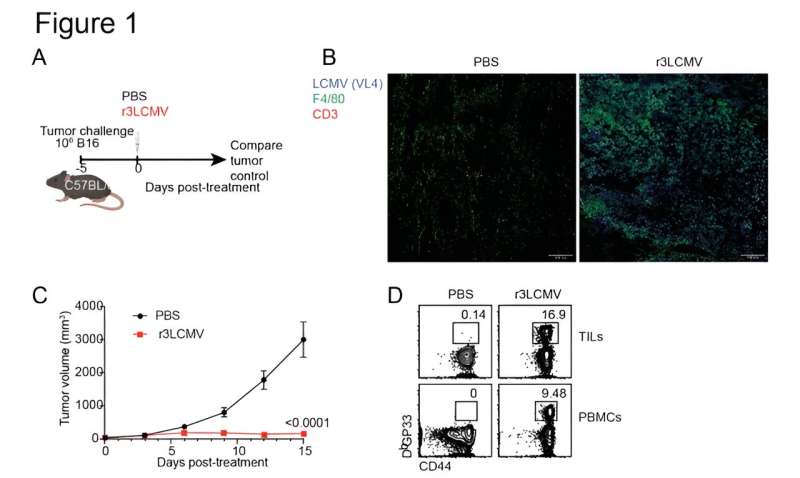This article has been reviewed according to Science X's editorial process and policies. Editors have highlighted the following attributes while ensuring the content's credibility:
fact-checked
peer-reviewed publication
trusted source
proofread
Safer virus helps eliminate cancer in mouse study

Northwestern Medicine scientists have discovered that an attenuated (weakened) virus can help eliminate cancer in mice. In addition, mice that were treated with this virus were more resistant to developing tumors later in life.
The attenuated virus—lymphocytic choriomeningitis virus (LCMV)—works and is safe even in immunosuppressed mice. That's a critical finding, as many cancer patients undergoing chemotherapy and other cancer treatments have suppressed immune systems.
"An important aspect about this viral-based therapy is that it demonstrates safety and efficacy even in an immunosuppressed host," said corresponding author Pablo Penaloza-MacMaster, an assistant professor of microbiology-immunology at Northwestern University Feinberg School of Medicine. "Mice that were devoid of their killer T cells and their B cells were nonetheless responsive to this therapy."
The Northwestern scientists showed in multiple tumor models—including melanoma and colon cancer—that injecting tumor-bearing mice with this virus shrank the tumor and increased survival.
The study is published June 11 in The Journal of Clinical Investigation.
"LCMV induces a high immune response, but it can cause disease especially in transplant patients," Penaloza-MacMaster said. "With molecular biology, however, it is possible to weaken this virus and render it attenuated for use as a safe therapy, while still being immunogenic. The other advantage is that it seems that the same LCMV therapy can be used for various types of cancer."
Currently, so-called "oncolytic viruses" such as herpes are used to treat some types of cancer because of their ability to kill cancer cells. But these therapies are not effective with some tumors and their use poses safety concerns, especially in immunosuppressed patients, underscoring the need for safer alternatives, Penaloza-MacMaster said.
In addition to helping clear the tumors, the therapy also helped prevent future cancer in these mice. Healthy mice that were first treated with the LCMV therapy were more resistant to developing tumors later in life.
This phenomenon might be explained by a poorly understood biological process known as "trained immunity." Trained immunity occurs when a previous infection enhances the immune system's ability to respond to different diseases in the future. For example, studies have shown that children who received the tuberculosis (TB) vaccine exhibit improved protection against other microorganisms, not just TB. This differs from the typical vaccine response, such as with the SARS-CoV-2 vaccine, which primarily protects against this specific virus.
"Essentially, this therapy might be providing broader immune protection, helping the body to guard against different diseases beyond the original target," said Penaloza-MacMaster, a member of the Robert H. Lurie Comprehensive Cancer Center of Northwestern University.
The next step in this research is to test the approach on dogs with sarcoma in collaboration with Dr. Seth Pollack, the Steven T. Rosen Professor of Cancer Biology at Feinberg and director of the Sarcoma Program at Lurie Cancer Center. If the dogs also show improvement, scientists hope to launch a clinical trial using the therapy with humans.
How does a virus treat cancer?
Tumors are skilled at evading the immune response by developing strategies to keep the immune system away from the tumor. Injecting the virus into the tumor raises the equivalent of red flags on the tumor to alert the immune system that there is an intruder.
The immunosuppressed mice had no T cells, B cells or macrophages (key immune cells). Despite the absence of these crucial immune cells, the virus was able to activate alternative immune pathways to fight the cancer. One way it did this was through interferons—molecules that signal the presence of an intruder and help rally the body's defense mechanisms.
Other Northwestern authors include first authors Young Rock Chung and Bakare Awakoaiye, and co-authors Tanushree Dangi, Nahid Irani and Slim Fourati.
More information: Young Rock Chung et al, An attenuated lymphocytic choriomeningitis virus vector enhances tumor control in mice partly via IFN-I, Journal of Clinical Investigation (2024). DOI: 10.1172/JCI178945


















